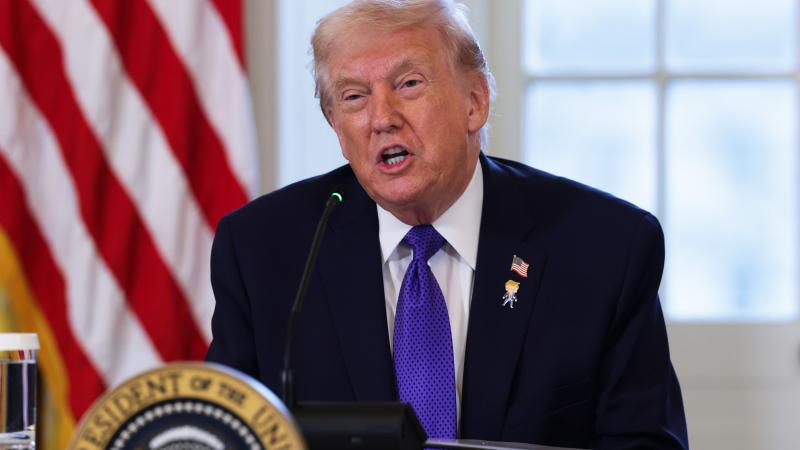Four weeks in, Biden now wants 'pause' in fighting after vowing 'unwavering' support for Israel
Bowing to pressure? Biden visited Israel in mid-October in a diplomatic mission that appeared to be the high-mark of the administration's support for Israeli operations. Now that far-left progressives are pushing back, his "rock solid and unwavering" support for Israel may be changing.
In the wake of an Oct. 7 Hamas raid, President Joe Biden vowed that his administration's support for Israel would be "rock solid and unwavering" but has since softened his position and is now calling for a humanitarian "pause" in the ongoing conflict.
The terrorist raid saw Hamas forces storm out of the Gaza Strip, seize Israeli border towns, take roughly 200 hostages, and inflict more than 1,000 civilian casualties. Its sheer scope caught the Israel Defense Forces flat-footed and Jerusalem has since mounted strikes on Gaza, which houses a network of tunnels that serve as operation bases for Hamas among the civilian population. In the aftermath of Hamas' attack, Biden spoke with Israeli Prime Minister Benjamin Netanyahu and expressed the United States' support for Israel.
Biden backs Netanyahu
"When I spoke to Prime Minister Netanyahu this morning, I told him the United States stands with the people of Israel in the face of these terrorist assaults. Israel has the right to defend itself and its people. Full stop. There is never a justification for terrorist attacks. And my administration’s support for Israel’s security is rock solid and unwavering," he said on October 4.
To that end, President Joe Biden has asked Congress to approve a $106 billion security funding package, including $14.3 billion for Israel and $61 billion for Ukraine. House Republicans have attempted to push through an Israel-only aid bill, though Biden has vowed to veto any measure that does not pair support for both nations.
The hostilities meanwhile, have persisted throughout the subsequent month and have threatened to spill over into neighboring nations. Cross-border exchanges have already occurred between Israel and its northern neighbors, Lebanon, Yemen and Syria. Moreover, anti-Israel riots have erupted in nearby Islamic nations, with the most notable occurring in Jordan and Turkey.
Biden visited Israel in mid-October in a diplomatic mission that appeared to be the high-mark of the administration's support for Israeli operations. At the time, Israel was preparing for a ground invasion of the Gaza Strip. Biden, shortly prior to his arrival, had suggested that an Israeli occupation of Gaza "would be a mistake."
Internal dissent goes public
Amid Biden's visit, cracks began to emerge in the administration's thus-far-stalwart support. One senior State Department official publicly resigned over the administration's handling of the Israel-Hamas conflict.
"I believe to the core of my soul that the response Israel is taking, and with it the American support both for that response, and for the status quo of the occupation, will only lead to more and deeper suffering for both the Israeli and the Palestinian people – and is not in the long term American interest," Josh Paul, the former Director of Congressional & Public Affairs for the department's Bureau of Political-Military Affairs, said in his public goodbye letter.
The following day, reports emerged of a "mutiny" within the State Department over Biden's support for Israel as personnel began preparing a "dissent cable" to protest the administration's policy.
The narrative shifts
Roughly a week later, reports broke that the Biden administration was private urging Israel not to outright invade Gaza but to pursue more limited strikes against Hamas.
"They have clearly shifted from an initial 'We have your back; we’ll do whatever you want' to now 'You really need to rethink your strategy.' And they’re doing it in a careful way," an unnamed source told the Washington Post in late October. The ostensible aim of limiting the campaign was to minimize civilian casualties and contain international backlash to an Israeli counteroperation. Israeli troops have since entered Gaza and pursued engagements with Hamas forces.
Biden's transition from stalwart Israel-backer to voice of caution culminated this week with his call for a "pause" in the fighting to allow for the rescue or return of hostages.
"I think we need a pause," he said. "A pause means give time to get the prisoners out."
Netanyahu has since rejected the prospect of a "ceasefire" between Israel and Hamas unless the group releases its hostages first.
"Israel refuses a temporary ceasefire that does not include the return of our hostages," he said this week, putting the pair in apparent conflict.
Islamic-American outrage gets louder
The same day he called for a pause, Biden announced a national strategy to combat Islamophobia, amid mounting antisemitic threats nationwide and a litany of scandals involving elite academic institutions and their alleged complicity as a safe haven for anti-Jewish sentiment. Biden's discernible pivot in rhetoric amid the conflict and the clear dissonance between his statements and those of Netanyahu, may stem from intense Muslim-American backlash to his administration's stance.
The White House has remained silent upon the issue of several of his administration's officials pro-Palestinian social media postings.
While far-left members of Congress, most notably Rep. Rashida Tlaib, D-Mich., who is of Palestinian background, have openly expressed support for the Palestinian people and called for a ceasefire, public criticism of Biden from Arab-American and Islamic voices has escalated considerably in recent weeks. Tlaib accused President Joe Biden of supporting "the genocide of the Palestinian people," in a video posted on X last week.
The National Muslim Democratic Council, in late October, issued a pointed warning to Biden, asserting that if he did not secure a ceasefire by Tuesday, Nov. 7, the group would actively work against his candidacy in 2024.
"It has become evident that our voices are being ignored, but our votes will not be. Simply put, as Gaza turns red, so could crucial battleground states," the group said. "Your administration's unconditional support, encompassing funding and armaments, has played a significant role in perpetuating the violence that is causing civilian casualties and has eroded trust in voters who previously put their faith in you."
The polling data is sobering
The NMDC's threat's appear to be based in tangible public opinion changes. Nationwide, Muslims make up roughly 1.3% of the population and a survey published this week by the Arab American Institute revealed a marked decline in support for Biden among that constituency.
"The precipitous drop in Arab American support for the president was unprecedented in our 27 years of polling this community. It shows the importance of the Palestinian issue and deep disappointment with the failure of the administration to address it," AAI President James Zogby said, according to the Wall Street Journal.
Support for Biden's reelection bid among Arab Americans dropped from 59% in 2020 to a mere 17% this month. His approval rating moreover, went from 74% in 2020 to 29% now. In addition, The Guardian (UK) has noted that online, many progressives seethed, accusing Biden of further enabling violence against Palestinians and predicting that he would pay an electoral price next year with Muslim and Arab American voters, who have emerged as an important Democratic constituency in recent elections.
Arab frustrations with Biden have had a considerable impact on their view of his party moreover. The AAI noted that their October survey marked the "first time in our 26 years of polling Arab American voters in which a majority did not claim to prefer the Democratic Party."
Stunningly, a plurality of those survey, 32%, indicated they identified as Republicans. Just 23% said they were Democrats, with 31% identified as independents, 12% were unsure, and 2% backed another party. Compounding that development is former Donald Trump's attracting 40% support to Biden's 17.4% in a hypothetical matchup. Trump received 35% support among the blocked in 2020 to Biden's 59%.
A further 13.7% backed Robert F. Kennedy Jr., 3.8% chose Cornel West, and 25.1% were undecided.
Ben Whedon is an editor and reporter for Just the News. Follow him on X, formerly Twitter.
The Facts Inside Our Reporter's Notebook
Links
- vowed to veto
- Yemen
- Syria
- Jordan
- unnamed source told the Washington Post
- "I think we need a pause," he said
- Biden announced a national strategy to combat Islamophobia
- The Guardian (UK) has noted
- X
















